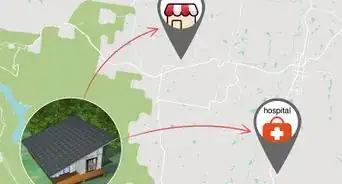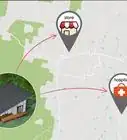This article was co-authored by Seth Hall. Seth T. Hall is a Certified Life Coach and Founder of Transformational Solutions, a Los Angeles-based life-coaching company that helps people achieve their toughest goals, find their own voice, and think outside the box. He has been a life coach for over 10 years, specializing in personal development, relationships, career and finance, and wellness. He has helped his clients break the negative cycles in their lives and replace them with a positive, proactive mindset. Seth believes that everyone has the potential to live a fulfilling and rewarding life, and works passionately to help them reach their full potential. With a deep understanding of how our minds work and the power of positive thinking, he encourages his clients to find their unique paths in life and find success on their own terms. He is a certified master practitioner of Neuro-Linguistic Programming, a featured co-author for WikiHow, and co-author of "The Mountain Method”, “The Happy Tiger”, and “The V.I.S.I.O.N.S. Program”.
There are 7 references cited in this article, which can be found at the bottom of the page.
This article has been viewed 79,294 times.
Deciding where to live is a big decision. Do not make it lightly – but also remember that your choice does not need to be final. Take some time to think about what's most important to you. Weigh your ideals against your realities. When the time comes: make the choice that feels the most right, and take the leap!
Steps
Exploring Your Options
-
1Make a list. Write down the cities, states, nations, or regions that float to the top of your mind when you think about where you might want to live. Your list may be very short or very long. If you don't already have a few places in mind, then you will need to do more research in order to better understand what you're looking for.
-
2Research. Run a web search, talk to people, and read guidebooks in order to learn more about each place that finds its way onto your list. Read about the history, the culture, the scenery, the economy. Try to pin down what it is, exactly, that draws you to this place.
- Ask your friends. If you are considering moving to a city, and you know someone who has lived in that city before: be sure to ask this person for their perspective. Keep in mind that what works for one person does not always work for another!
Advertisement -
3Notice the trends. Look for the common factors between the places that you are considering living. Then, use these patterns to help yourself understand what sort of place, generally, you are looking for: urban, rural, or suburban; mountainous or seaside; east coast or west coast. Once you've identified a few similar options, try to parse out the more subtle differences between these places.
- If you listed San Francisco, Portland, and Seattle, consider that these are all relatively young, affluent, tech-driven cities along the West Coast of the United States. Perhaps you are looking for a certain sort of energy that you identify with these particular urban centers. To narrow down your decision, examine the differences between these cities.
- If you listed Montana, Alaska, and Colorado, then you probably want to live somewhere mountainous, outdoorsy, and relatively unpopulated. There are many similarities between these three states, but there are also many differences. Research each state to better understand the difference.
-
4Visit. If you are intrigued by the idea of a place, try to check it out in person before you make any serious decisions. Take any opportunity that you get to visit the area, speak with the people, and imagine yourself living there. Try staying there on holiday if you can, renting temporary accommodation to get a real feel of life in your desired location.[1]
- If you are thinking of moving relatively nearby, then you can visit on a weekend or a day off. If you are thinking of living somewhere far away, then make sure that you have the time and resources to get there and back.
Evaluating Aesthetics
-
1Consider the culture. Learn about the music scene, the party scene, the food scene – anything that you think would enhance your quality of life.[2] Try to grasp the cultural idiosyncrasies that make each place unique. Read about the ratio of younger people to older people, and try to see the trends in why people are moving to a particular place.
- Perhaps your favorite band or a beloved author hails from a certain city. Maybe you've heard that a city has a notoriously active and outdoorsy populace.
- Living around others who are in the same socioeconomic bracket can be more comfortable than living among people who make considerably more or less than yourself. Whether you will be renting or owning a home in your new area, try consulting with a real estate agent to get a better idea of the neighborhood.
-
2See the romance in a place. It is important to make an informed and practical decision, but you should also find a reason to be enthused about the place you're going to live. Create a mental image of what life would be like here, and then evaluate whether that life is something you want.
-
3Understand what the climate is like. Determine whether you want to live somewhere hot, cold, wet, dry – near the coast or in the mountains. Basic research on a city or region should give you a good idea of the weather patterns. Consider the effects that a different climate (say, a very rainy place, or somewhere that freezes over in the winter) will have upon your lifestyle and your goals. Consider the temperature, the average precipitation, the air pollution, and the seasonal flux.
- Some people suffer from Seasonal Affective Disorder (SAD), which is a cyclical depression pattern related to the changing of the seasons. People often find themselves most down in the winter or the rainy season, when the skies are cold and overcast.[3]
- If you are unsure of the climate in a particular area, the National Oceanic and Atmospheric Administration (NOAA)[4] has excellent data on everything from temperature to air pollution.
-
4Learn about the risk of natural disasters. This can also help swing your decision, although it may not be the most weighty concern. Some areas face a high risk of hurricanes and tornadoes, while other areas get a lot of earthquakes. Some areas are prone to drought, and others to mighty storms. Inform yourself of the danger so that you can make a conscious choice.[5]
Getting Practical
-
1Take money into account. Move to a place that you can afford, but that also provides you with the opportunities you want. Your money will go much further in some regions than it will in others. On the other hand, the jobs that you'll find in a more expensive area will also typically pay you more. This is the dilemma: the places with the most opportunity are often the most expensive to live, and the most affordable places are often less conducive to building a career.[6]
- Do not let money be the only deciding factor. Yes, you should move to a place where you'll be able to support yourself and you family. First and foremost, however, you should be excited about where you're going.
-
2Think about work. Factor your current and future career into the equation. Consider searching for jobs in potential new cities just to get an idea for what's out there. Look for areas that feature a lot of jobs in a field that interests you.[7]
- If you plan to keep your current job, then it may not be feasible to move somewhere that involves a lengthy commute.
-
3Make the right choice for your children. If you will be moving with children or expecting children, then research which areas have the best opportunities for education. Imagine how the culture and opportunities of a given area will impact the way that a child is raised. Pick a place that will provide a nurturing and stimulating environment for your children to call "home."
- Think about the sort of support system that will be available. It can be much easier to raise children, both financially and logistically, if you are living near a network of family and close friends.
- If you homeschool your child, make sure to look into homeschooling groups for a given area. Some regions are much more friendly to homeschoolers then others.
Expert Q&A
-
QuestionWhat factors make a city a nice place to live?
 Seth HallSeth T. Hall is a Certified Life Coach and Founder of Transformational Solutions, a Los Angeles-based life-coaching company that helps people achieve their toughest goals, find their own voice, and think outside the box. He has been a life coach for over 10 years, specializing in personal development, relationships, career and finance, and wellness. He has helped his clients break the negative cycles in their lives and replace them with a positive, proactive mindset. Seth believes that everyone has the potential to live a fulfilling and rewarding life, and works passionately to help them reach their full potential. With a deep understanding of how our minds work and the power of positive thinking, he encourages his clients to find their unique paths in life and find success on their own terms. He is a certified master practitioner of Neuro-Linguistic Programming, a featured co-author for WikiHow, and co-author of "The Mountain Method”, “The Happy Tiger”, and “The V.I.S.I.O.N.S. Program”.
Seth HallSeth T. Hall is a Certified Life Coach and Founder of Transformational Solutions, a Los Angeles-based life-coaching company that helps people achieve their toughest goals, find their own voice, and think outside the box. He has been a life coach for over 10 years, specializing in personal development, relationships, career and finance, and wellness. He has helped his clients break the negative cycles in their lives and replace them with a positive, proactive mindset. Seth believes that everyone has the potential to live a fulfilling and rewarding life, and works passionately to help them reach their full potential. With a deep understanding of how our minds work and the power of positive thinking, he encourages his clients to find their unique paths in life and find success on their own terms. He is a certified master practitioner of Neuro-Linguistic Programming, a featured co-author for WikiHow, and co-author of "The Mountain Method”, “The Happy Tiger”, and “The V.I.S.I.O.N.S. Program”.
Life Coach That usually depends on your values. If you value peace and quiet, don't go looking for a downtown location; if you want to work with money and stock, you could go to a big city; if you love tech, look for a city that's in Silicon Valley, etc.
That usually depends on your values. If you value peace and quiet, don't go looking for a downtown location; if you want to work with money and stock, you could go to a big city; if you love tech, look for a city that's in Silicon Valley, etc.
Warnings
- Plan way ahead of time. If you move on the spur of the moment, you could lose money, possessions, a job you might have been able to transfer to the new area. For more info on how to move, see the related wikiHows.⧼thumbs_response⧽
- Moving can be expensive, so consider if you really need to move at all.⧼thumbs_response⧽
References
- ↑ http://www.artofmanliness.com/2011/02/15/craft-the-life-you-want-setting-up-shop-or-the-importance-of-where-you-live/
- ↑ Seth Hall. Life Coach. Expert Interview. 16 November 2021.
- ↑ http://www.mayoclinic.org/diseases-conditions/seasonal-affective-disorder/basics/definition/con-20021047
- ↑ http://www.noaa.gov
- ↑ http://lifehacker.com/top-10-ways-to-find-the-best-place-to-live-1634031154
- ↑ http://www.theatlantic.com/business/archive/2014/11/why-its-so-hard-for-millennials-to-figure-out-where-to-live/382929/
- ↑ http://www.moneycrashers.com/where-should-i-live-decide-best-places/
About This Article
To decide where to live, start by making a list of places that appeal to you. Next, do research on the economy, culture, and climate of those places and look for common factors among the places on your list to help you understand what kind of place you’re looking for. Make sure you factor in affordability, job opportunities, and, if you have children, which places have the best opportunities for education. Once you’ve narrowed the choices down to a few places, try to visit the areas before you make any final decisions. For more tips, like how to take money into account, read on!






































































